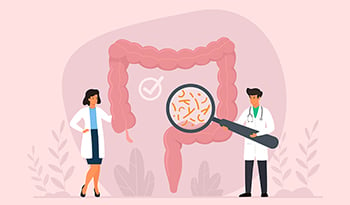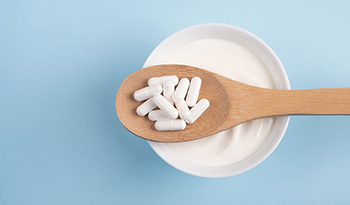Digestive Enzyme Benefits: How They Fight Bloating, Gas + More

Key Takeaways
- Enzymes help break down food to significantly reduce common issues like gas, bloating, and indigestion.
- They improve the breakdown of proteins, fats, and carbs, helping you get more value from your food and easing many food intolerances.
- For best results, choose a high-potency, multi-enzyme blend and take one or two capsules just before meals.
Why You Might Need Digestive Enzymes
Digestive complaints affect nearly one in three adults. One of the most popular natural digestive aids is digestive enzyme supplements.
Many people suffering from digestive issues may not be secreting enough active digestive enzymes or may need additional help. Supplementation with digestive enzymes may help.1,2
In this article you will discover the key benefits of supplementing with digestive enzymes and how they can help you get the most from your food.
Symptoms Of Digestive Enzyme Deficiency
While many factors can contribute to that uncomfortable feeling of fullness, bloating, or gas after a meal, lack of digestive enzymes is a common underlying culprit. Here are common symptoms of digestive enzyme deficiency:
- Bloating
- Gas
- Diarrhea
- Stools that float
- Abdominal pain or cramping
What Are Enzyme Supplements?
Enzyme supplements contain proteases to break down protein, amylases to break down carbohydrate and starch, and lipases to break down fat.
These three enzymes break down the majority of the common food groups. Other enzymes include lactase (breaks down lactose), alpha-galactosidase (breaks down fermentable carbohydrates), maltase and sucrase (break down food sugars), and cellulase (break down cellulose in plant foods).
Benefits Of Digestive Enzyme Supplements
Reduce Gas, Bloating, and Indigestion
Improperly digested food is a big factor in producing digestive issues such as gas, bloating, occasional heartburn and/or indigestion, and altered bowel function. Digestive enzymes relieve these bothersome symptoms by breaking down food components into their absorbable units.1,2
Improve Nutrient Absorption
By helping the body break down food into its absorbable components, digestive enzymes aids the proper digestion of protein, carbohydrates, fats, vitamins and minerals. Without digestive enzymes, these nutrients can pass through the body unabsorbed.
Improve the Microbiome and Bowel Function
By promoting proper digestion, digestive enzymes encourage a healthy intestinal environment and microbiome, and may help relieve occasional constipation and irregularity.
Help with Common Food Intolerances
Many food intolerances are simply the result of incomplete digestion. A good example of this situation is lactose intolerance. Lactose is a sugar found in milk. Lactase is an enzyme that lies on the surface of the small intestine that breaks the bond of the two sugars that compose lactose. If the body is not producing enough lactase, the lactose is not broken down and it can result in gas, bloating, or even diarrhea. Supplying lactase as a dietary supplement provides the missing enzyme action, helping break down lactose into simpler sugars (glucose and galactose) that can be easily absorbed, allowing for less severe or no symptoms.3 Intolerances can also result from incomplete protein, carbohydrate, or fat digestion.
Another common food intolerance is to FODMAPs (fermentable oligosaccharides, disaccharides, monosaccharides, and polyols). These compounds are found in most fruits and vegetables. A low FODMAP diet is often recommended to deal with gas and bloating, but since many of the food sources are actually health-promoting foods, taking digestive enzymes to help digest FODMAPs makes more sense. One clinical trial showed that supplementing with the enzyme alpha-galactosidase with meals produced equal results compared to a low FODMAP diet in people with chronic gas and bloating.4 However, rather than taking only alpha-galactosidase, I recommend a more comprehensive digestive enzyme formula that includes this enzyme.
Support a Healthy Inflammatory Response
If food is not digested properly, it can irritate and potentially damage the sensitive intestinal lining, and that leads to inflammation. Over time, this irritation may result in increased intestinal permeability (i.e., a leaky gut), leading to the absorption of gut-derived toxins and other unwanted compounds into the body. Many enzymes, especially proteases also exert significant anti-inflammatory activities.5
Dosage Recommendations + Safety
When taken with food, most often just before meals, digestive enzymes aid in the digestion of all foods. As there are considerable differences in potency and quality of digestive enzymes in the marketplace, the best advice that I can give is simply to choose well-respected brands and follow label instructions. The great thing about using digestive enzyme supplements is that you can tell if they are working and they are safe. If you do not feel the improvement, change the dosage or the product.
When you look at the ingredient list of a high-quality enzyme product, you will find measurement units you may not be familiar with. What is more important than the amount of enzyme in weight (e.g., mg amount) is the activity level. For most enzymes, activity is expressed in units of measurement and testing methods established by the Food Chemicals Codex (FCC).
The best results are obtained when a digestive enzyme product contains a blend of different variants of the major categories of enzymes (proteases, lipases, amylases). This allows for different ranges of pH activation so that the enzymes are effective throughout the entire gastrointestinal tract.
Side Effects
Enzymes are typically very well tolerated and usually have no side effects. A very small percentage of people have reported upset stomach and soft stool (more frequent and softer bowel movements) when first beginning to take a high-potency digestive enzyme supplement. As with any adverse effect, discontinue use and consult a health care practitioner if needed.
Frequently Asked Questions About Digestive Enzymes
How quickly will I feel results with the use of digestive enzymes?
Some individuals may experience immediate improvements in their digestion. Others may experience more gradual benefits. In general, the effects of digestive enzymes can be felt more quickly than other nutritional products.
The typical experience allows for a self-evaluation of benefits after just two weeks of use because of the speed of results with enzymes. Many people benefit from a 14-day trial with a high-potency digestive enzyme preparation. In the 14-day challenge, simply take one or two capsules of the enzyme supplement before each meal. Improving digestion via supplemental enzymes is often all that is necessary to eliminate a food intolerance.
What causes decreased production of digestive enzymes?
Genetics certainly plays a role but the biggest culprits for most people are the effects of stress and aging. Aging actually leads to actual structural changes in the pancreas as well as reduced output of digestive enzymes.
It is not uncommon for people who have eaten foods they love for years without complaints to all of a sudden symptoms every time they eat these foods. Symptoms may range from minor gas, pain, nausea, and bloating to severe cramping and diarrhea when there is an insufficiency of digestive enzymes.
Where do digestive enzymes come from?
For many years, the primary source of supplemental digestive enzymes was from hog pancreas (pancreatin)and included enzymes like trypsin and chymotrypsin. However, the development of microbial and plant-based enzymes is revolutionizing enzyme therapy.6,7 While plant sources such as papain from papaya and bromelain from pineapple have been around a very long while, relatively new are the enzymes produced by microorganisms, most notably from the Aspergillus family. These enzymes have a strong record of safe use in the food industry and as dietary supplements. Of all the choices, these microbial enzymes are the most potent. This means they can break down more fat, protein, and carbohydrates than any other source. They are also able to work in a larger pH range than any other source.4
Do digestive enzyme supplements stop the body from producing its own enzymes?
No, the body will continue to manufacture the enzymes needed to benefit from food as best it can; supplemental digestive enzymes simply aid the digestive process. The major producer of digestive enzymes in the body is the pancreas. Digestive enzyme supplementation can take stress off the pancreas, but it does not impair its function.
What digestive enzyme supplement do you recommend?
As a naturopathic physician who has worked in helping patients with poor digestion, I know firsthand how digestive enzymes can produce powerful benefits. There are several high-quality multiple enzyme products on the market, including California Gold Nutrition’s Digestive Enzymes. The key is to use multienzyme products that clearly state the strength of the enzymes in units accepted by the Food Chemicals Codex, a compendium of internationally recognized standards for the identity, purity, and quality of food ingredients, including digestive enzymes.
References:
- Ianiro G, Pecere S, Giorgio V, et al. Digestive Enzyme Supplementation in Gastrointestinal Diseases. Curr Drug Metab. 2016;17(2):187-93
- Roxas M. The role of enzyme supplementation in digestive disorders. Altern. Med. Rev. 2008;13(4):307–314.
- Corgneau M, Scher J, Ritie-Pertusa L, et al. Recent advances on lactose intolerance: Tolerance thresholds and currently available answers. Crit Rev Food Sci Nutr. 2017 Oct 13;57(15):3344-3356.
- Tuck CJ, Taylor KM, Gibson PR, Barrett JS, Muir JG. Increasing symptoms in irritable bowel symptoms with ingestion of galacto-oligosaccharides are mitigated by [alpha]-galactosidase treatment. Am. J. Gastroenterol. 2018;113:124.
- Narayanan KB. Enzyme-Based Anti-Inflammatory Therapeutics for Inflammatory Diseases. Pharmaceutics. 2025 May 2;17(5):606.
- Pierzynowska K, Valverde-Piedra J, Szymanczyk S, et al. Pancreatic-like enzymes of microbial origin restore growth and normalize lipid absorption in a pig model with exocrine pancreatic insufficiency. Arch Med Sci. 2018 Mar;14(2):407-414.
- Cioni P, Gabellieri E, Campanini B, et al. Use of Exogenous Enzymes in Human Therapy: Approved Drugs and Potential Applications. Curr Med Chem. 2022;29(3):411-452.
DISCLAIMER:This Wellness Hub does not intend to provide diagnosis...

















































































 Table of Contents
Table of Contents















